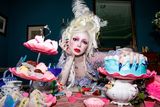Jade Goody’s rise and fall: Branded idiot, racist then saint
A new series looks at the celebration of ignorance, stupidity and the sentimental slush that followed the death of a reality star, writes Pat Stacey
When Jade Goody died aged 27 from cervical cancer 10 years ago, even The New York Times reported the news. That august journal, righteous guardian of the truth, currently engaged in the battle to hold onto the soul of America and the fabric of reality, concerning itself with the death of an English reality TV star who’d risen to prominence on the tacky Big Brother? Strange. Very strange.
That’s how big Goody had become. Even bigger, if anything, in death than in life. Being The New York Times, the report was clear-eyed and dispassionate and unsentimental. Between the lines, maybe even a little disdainful. A little “ugh”.
It invoked the word picayune in relation to the way Goody had managed the adult portion of her short life. It’s a quirky word, North American in origin, that you don’t hear much around these parts. It means “of little value or significance”.
The context: “Having sold even the most picayune details of her life for the previous six years to tabloid newspapers and celebrity magazines, she resolved to do the same for her death.”
The tone was markedly different to the gush of slush, the geyser of stomach-turning hypocrisy that was in full eruption back in Goody’s home country. The tabloids were all over her again, just as they’d been all over her seven years earlier when she appeared on Big Brother 3, first to stomp her into the dirt for being a thick, ignorant, vulgar “chav”, then — as the tide of public opinion changed halfway through the series — to elevate her to the level of beloved national treasure.
It didn’t last long. The tide turned back the other way in 2007, when Goody returned to the Big Brother house for the celebrity version and was stomped all over again for orchestrating, with fellow housemates Jo O’Meara and Danielle Lloyd, a nauseating campaign of racist abuse against a third contestant, Indian actress Shilpa Shetty. Goody was reviled.
Jade Goody with Big Brother housemate Shilpa Shetty
The final switcheroo occurred a year later with the news that Goody had cervical cancer. The diagnosis was delivered to her by a doctor in England while she was 7,658km from home, appearing on the Indian version of Big Brother. Her reaction was captured on camera. Naturally.
This time, the elevation was complete. In the tabloids and celebrity magazines, Goody was raised to the status of princess, icon, role model, martyr. Complete and completely paid for.
She starred in her own TV series, opened her second beauty salon, released her second autobiography. Given just weeks to live, she negotiated a £750,000 deal with OK! magazine for the right to cover her wedding to Jack Tweed.
“I’ve lived my whole adult life talking about my life,” she told an interviewer from her hospital bed. “I’ve lived in front of the cameras, and maybe I’ll die in front of them.”
Following her death, then UK prime minister Gordon Brown was moved — or more likely briefed — to describe her as “a courageous woman in both life and death”. This is how things had changed by then. How television, celebrity and the media had changed. How British society had changed.
And the agents of that change at a time when social media was still wriggling in its infancy were Jade Goody and the red-top media, engaged in an ongoing dance, literally to the death, of vilification, exploitation, manipulation and, eventually, collusion and counter-manipulation.
Jade Goody
It’s all recounted in Rob Coldstream’s three-part series Jade: The Reality Star Who Changed Britain, which began on Channel 4 last night and continues for the next two Wednesdays. This is not like you imagined it would be. Anyone tuning in expecting a facile celebration of Goody’s life — the Heat magazine version of history — will be surprised. Anyone choosing not to tune in for the same reason would be wise to reconsider.
This is a serious documentary that uses Goody’s rollercoaster life as a prism through which to look at a bigger story of class, politics, massive cultural shifts, media degeneration and the polarising effect of reality television on British society. It’s alternately riveting and repellent.
There’s a gallery of talking heads: Goody’s mother Jackiey (that’s how she spells it) Budden; Jeff Brazier, her former boyfriend and the father of her two children; former Big Brother presenter Davina McCall; an assortment of newspaper hacks, paparazzi and agents; some of her fellow housemates and a clutch of Channel 4 production types.
Other than McCall, who’s compassionate, none of the people interviewed — and least of all the TV and media people — come out of it with much credit.
“Jade didn’t go into Big Brother for fame, you know, she went in to get away from me,” says Budden, a physical wreck from years of drug abuse. When she talks about how she and her fellow addict husband, who walked out on them early on, would casually shoot up heroin while their daughter was present, and how Jade was adept at rolling her a spliff when she was five, you can almost believe it.
Like a lot of stories, it begins near the end with Goody, bald because of her cancer treatment, in her white wedding dress, hovering over her domain in a helicopter paid for by the magazine, and then flips back to 2002.
Jade Goody walking up the aisle
“She had that fingernails-on-a-blackboard thing, but you couldn’t not watch her,” says Big Brother executive producer Ruth Wrigley. “She totally delivered. The viewers hated her. She was too loud, too much.”
Which, of course, made her perfect fodder for the show — especially when she displayed her apparent ignorance. She thought “East Angular” was in another country, that Rio de Janeiro was a person, that Portugal was a place in Spain, and that people in America didn’t speak English.
Read more:
The tabloids pounced, mocking, sneering, jeering. Worse, though, was to come. Goody played up, and acted up, for the cameras. She was loud, annoying, crass, obnoxious, backstabbing and insufferable. She got naked and streaked through the house. She ended up drunk and in bed with housemate PJ Ellis.
“It was like the Christmas party snog, but in front of a million people,” he recalls. Well, it was a bit more than that. Goody fellated him under the bed covers, with the cameras watching. But that was OK, says a Big Brother executive, because it didn’t violate the programme’s “penetration policy”.
Suddenly, according to the tabloids, Goody was “the most hated woman in Britain”. A thick, ugly chav who represented everything that was wrong with young, working-class Britons. “Vote out the pig!” ran one headline.
Showbiz types joined in. There’s a clip of lovely Graham Norton, who everyone loves because he’s lovely, being less than lovely back then. We see him in a naked fat suit, pretending to be Goody. It’s nasty, frankly.
A Daily Mirror hack called Kevin O’Sullivan chuckles as he looks over the old columns he wrote about Big Brother — and primarily about Goody — on a daily basis. “My job was to take every show every night and piss all over it,” he says, smiling at the memory. None of it would be acceptable, none of it would make it into print nowadays, even in the era of the social media cesspit.
Read more:
“It shows that in those days it was a harsher world,” says O’Sullivan, as though he had nothing to do with it, as though “those days” were 100 years ago rather than just 19. It shocking to realise, at this remove, how astonishingly cruel and vicious it all was. How did things become so coarse, so horrible? How did society and the media get to that point? How did anyone get away with it?
Jade Goody pictured with her sons Freddie (right) and Bobby Jack
The Heat magazine version of history is that Goody was rehabilitated. The public started to love her (at least until the racism row), so the tabloids changed their tune. She came fourth in Big Brother but emerged as the real winner. She enjoyed the fruits of fame: the cars, the clothes, the jewellery, the endless freebies; the ego-boosting TV shows, ghost-written newspaper columns and magazine photoshoots that all brought in a fortune.
She learned to play the game. Celebrity photographer Danny Hayward talks about how he and Goody teamed up to produce “candid”photos that were as carefully storyboarded as any Hollywood movie and sell them to newspaper and magazines for insane amounts of money.
“She was savvy enough to know she could control her image,” he says. “Jade was the beginning of the world we live in today.”
There’s some truth in that. The world we live in does owe something to Goody and to the people who exploited her, and who she eventually exploited on her own terms. But it’s nothing to be proud of.
Whatever the ups and downs, the triumphs and tragedies of her life, her short spell of fame and notoriety represented the crossing of several lines that can never be crossed back over.
Join the Irish Independent WhatsApp channel
Stay up to date with all the latest news














